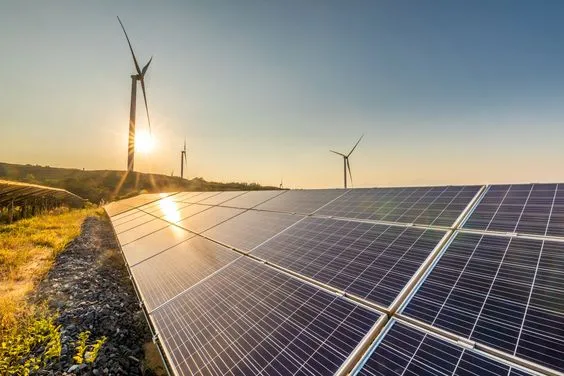Introduction of Solar Energy
Solar Energy is the radiant light and heat from the sun that is harnessed using a variety of technologies such as solar panels, solar thermal systems, and solar architecture. This form of energy is considered one of the most sustainable and environmentally friendly sources available. Solar panels, for instance, convert sunlight directly into electricity through photovoltaic cells. We have listed down the benefit of Solar Energy over conventional electricity in the rest of the article.
Solar energy is abundant and renewable, making it a key component in efforts to reduce greenhouse gas emissions and combat climate change. By tapping into this natural resource, we can generate clean energy without depleting finite resources or producing harmful pollutants.
How is Solar energy different from Electricity
While solar energy refers to the sun’s power in the form of light and heat, electricity is a form of electric charge through conductors, such as wires.
Here are some differences between Solar Energy and Electricity:
⇿Source and Generation
Solar Energy originates from the Sun and can be harnessed using photovoltaic cells(solar panels) or concentrated solar power systems.
Electricity can be generated from various sources, including fossil fuels(coal, natural gas,oil), nuclear power, hydroelectric dams, wind turbines, and solar energy itself.
⇿Form
Solar Energy exists naturally as sunlight and thermal energy.
Electricity exists as an electric current, which needs to be generated, transmitted, and distributed through power lines and grids.
⇿Renewability
Solar Energy is entirely renewable and inexhaustible as long as the sun exists.
Electricity’s renewability depends on its source. Electricity from fossil fuels is not renewable, while electricity from solar, wind, and hydro sources is renewable.
⇿Environmental Impact
Minimal environmental impact once the solar panels or systems are installed, producing no direct pollution or greenhouse gases.
The environmental impact varies with the source. Fossil fuel-based electricity generation is a major source of pollution and greenhouse gases, whereas renewable based electricity generation is much cleaner.
Usage and Application
Solar Energy can be used directly for heating, lighting, and generating electricity through solar panels.
Electricity, a versatile form of energy used to power homes, industries, and electronic devices.

Applications of Solar Energy
⇿Residential Use
Solar Panels(Photovoltaic Systems)
Homeowners can install solar panels on their roofs to generate electricity for their household needs. Any excess electricity can often be sold back to the grid.
Solar Water Heaters
These systems use solar collectors to capture and transfer heat to water, reducing the need for conventional water heating.
⇿Commercial and Industrial Use
Large-Scale Solar Farms
These installations consist of thousands of solar panels that generate electricity on a commercial scale, feeding power into the grid.
Solar Process Heating
Industries can use solar energy to generate the heat required for various manufacturing processes.
⇿Rural and Remote Areas
Off-Grid Solar Systems
In regions without access to the electricity grid, off-grid solar systems provide a reliable source of power, improving the quality of life and enabling economic activities.
⇿Transportation
Solar Powered Vehicles
Some experimental vehicles and small devices, such as solar-powered cars and boats, use solar panels to generate the energy needed for propulsion.
⇿Agriculture
Solar Powered Irrigation
Solar energy can power pumps for irrigation systems, making water more accessible for farming in remote areas.
Greenhouses
Solar energy helps maintain optimal temperatures within greenhouses promoting plant growth.
Advantages of Solar Energy
Sustainability
Solar Energy is a sustainable and inexhaustible resource.
Environmental Benefits
Solar Energy systems produce no direct air pollution, water pollution, or greenhouse gases. Conventional electricity generation, particularly from fossil fuels like coal and natural gas, is a major source of greenhouse gas emissions, air pollution, and environmental degradation.
These emissions contribute to global warming, acid rain, and health issues among populations.
In contrast, solar energy systems produce clean electricity without emitting greenhouse gases or pollutants. The use of photovoltaic(PV) panels to convert sunlight directly into electricity involves no combustion processes, making Solar Energy a truly clean and green power source.
Energy Independence
Utilising Solar Energy reduces dependence on important fuels and enhances energy security. Countries and regions that rely heavily on imported fossil fuels for electricity generation are vulnerable to geopolitical tensions, price fluctuations, and supply disruptions. By investing in Solar Energy, nations can reduce their dependence on external energy sources and enhance their energy security.
For individual households and businesses, installing solar panels can lead to self-sufficiency in energy production.
This not only cuts down on electricity but also provides a reliable power source in areas prone to power outages.
Low Operating Costs
While the initial installation cost of solar panels can be high, the long-term financial benefits are substantial. Once installed, solar energy systems have low operating and maintenance costs compared to traditional power generation methods.
Additionally, solar panels have a lifespan of 25-30 years or more, providing a long-term return on investment.
Government incentives, tax credits, and subsidies are often available to support the adoption of Solar Energy, further reducing the initial financial burden. Overtime, the savings on electricity bills can more than offset the installation costs, making Solar Energy a cost-effective solution.
Scalability
Solar energy systems can be scaled from small rooftop panels to large solar farms, making them adaptable for various needs.
Versatility and Scalability
Solar Energy systems are highly versatile and scalable. They can be installed on rooftops, integrated into building designs, or deployed in large solar farms. This flexibility allows Solar Energy to be used in a variety of settings, from urban to rural areas, and for different scales of energy needs, from small households to large industrial operations.
Future of Solar Energy
Advancements in technology and decreasing costs are making Solar Energy increasingly accessible and efficient. Innovations such as more efficient photovoltaic cells, better energy storage solutions, and integrated solar systems are set to enhance the viability and adoption of Solar Energy.
Governments and organisations worldwide are also implementing policies and incentives to promote Solar Energy, recognizing its potential to significantly reduce carbon emissions and combat climate change.
Conclusion
Solar energy offers a myriad of benefits over conventional electricity generation methods. Its environmental advantages, sustainability, potential for cost savings, and contribution to energy independence make it a superior choice for meeting future energy needs.
As technology continues to advance and the global community commits to reducing carbon emissions, Solar Energy will play an increasingly vital role in building a cleaner, more sustainable energy future. By embracing Solar Energy, we can protect the environment, enhance energy security, and promote economic growth for generations to come.












